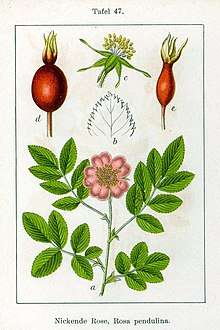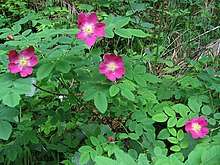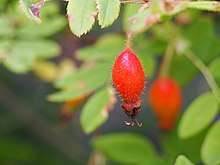Rosa pendulina
Rosa pendulina, (syn. Rosa alpina), the Alpine rose or mountain rose, is a species of wild rose found in the mountains of central and southern Europe. It appears to have survived in glacial refugia in the Alps and Carpathians, and spread out from there.[4] It prefers to grow in relatively warmer, shadier, and wetter areas alongside streams, in openings in forests, or on rock piles, between 350 and 2,500 m above sea level.[1] It has been introduced to New England and can be found growing as a garden escapee elsewhere.

| Rosa pendulina | |
|---|---|
 | |
| Scientific classification | |
| Kingdom: | Plantae |
| Clade: | Tracheophytes |
| Clade: | Angiosperms |
| Clade: | Eudicots |
| Clade: | Rosids |
| Order: | Rosales |
| Family: | Rosaceae |
| Genus: | Rosa |
| Subgenus: | R. subg. Rosa |
| Species: | R. pendulina |
| Binomial name | |
| Rosa pendulina | |
| Synonyms[3] | |
|
List
| |
Description
Rosa pendulina is a climbing (or rambling) shrub between 0.5 and 2 m, rarely 3 m tall. The flowers are typically semi-doubled and deep pink to fuchsia, brightening towards the center. It can be distinguished from other members of its genus by its relative lack of thorns (prickles), especially higher up on the plant, its oblong fruits (hips) which hang downwards (are pendulous, hence the specific epithet), its hispid peduncles and petioles, and its smooth stems and branches.[5] The chromosome number is 2n = 28.[6]

Cultivation
Often called by its synonym Rosa alpina, the Alpine rose has been in cultivation for hundreds of years (c. 1683), with many varieties that are practically forgotten today.[7][8][9] It has contributed genetically to an unknown, but large, number of extant rose cultivars.[10] It flowers early, has a pleasing, strong fragrance, and is nearly thornless, all desirable traits for rose breeders. An undesirable trait is that it has weak pedicels supporting the flowers, which leads to the pendulous habit of the fruits. It is hardy to USDA Zone 4a.
Varieties
Numerous varieties (and even subspecies) were described for R. pendulina and R. alpina (see list of synonyms), but these have all been collapsed into R. pendulina.
Hybrids
Rosa pendulina is said to be the parent of a number of hybrids.
- Rosa × anachoretica Schmidely (R. montana × R. pendulina)[11]
- Rosa × buseri Rouy (R. pendulina × R. sherardii)[12]
- Rosa × brueggeri Killias (R. glauca × R. pendulina)[13]
- Rosa × hispidocarpa (J.B. Keller) G. Beck (R. canina × R. pendulina)[14]
- Rosa × intercalaris Déségl. (R. pendulina × R. villosa)[15]
- Rosa × iserana Rouy (R. pendulina × R. rubiginosa)[16]
- Rosa × lheritierana Thory (R. chinensis × R. pendulina)[17]
- Rosa × reversa Kit. (R. pendulina × R. spinosissima)[18]
- Rosa × salaevensis Rapin (R. dumalis × R. pendulina)[19]
- Rosa × spinulifolia Dematra (R. pendulina × R. tomentosa)[20]
- Rosa × wasserburgensis Kirschleger (R. trachyphylla × R. pendulina × R. tomentosa)[21]
Cultivars
Many of these cultivars are quite old and would be assessed differently using modern standards. Rose fanciers tended to call all sports, chance seedlings, regional variants, natural hybrids, and artificial hybrids "varieties" rather than "cultivars". Some, such as the Boursault roses, would probably be considered Groups today. Simply having some R. pendulina ancestry, such as with the Moomin rose (Rosa 'Tove Jansson'), does not make a rose a cultivar of R. pendulina.
- 'Amadis' (Crimson Boursault. The Boursaults are said to be R. chinensis × R. pendulina with some uncertainty)[22][23]:7
- 'Bourgogne'[24]
- 'Calypso' (Blush Boursault)[25]
- 'Harstad'[26]
- 'Inermis', also called 'Morletti' or 'Morlettii'[25][23]:166
- 'Mount Everest'[23]:259
- 'Nana'[27]
- 'Plena'[28] (could be 'Inermis')
References
- "IUCN Red List of Threatened Species: Alpen-Rose". August 2013.
- Sp. Pl. 1:492. 1753
- "Rosa pendulina L." The Plant List.
- Daneck, Hana; Fér, Tomáš; Marhold Fls, Karol (2016). "Glacial survival in northern refugia? Phylogeography of the temperate shrub Rosa pendulina L. (Rosaceae): AFLP vs. Chloroplast DNA variation". Biological Journal of the Linnean Society. 119 (3): 704–718. doi:10.1111/bij.12619.
- Wilkes, John (1827). Encyclopædia Londinensis, Vol 22. p. 374.
- Bojnanský, Vít; Fargašová, Agáta (7 November 2007). Atlas of Seeds and Fruits of Central and East-European Flora: The Carpathian Mountains Region. p. 257. ISBN 9781402053610.
- Harkness, Peter (2003). The Rose: An Illustrated History. p. 101. ISBN 9781552977873.
- Wilson, Ernest Henry (1917). Aristocrats of the Garden. p. 12. ISBN 9781429012928.
- Harrison, Joseph (1851). The Floricultural Cabinet and Florist's Magazine. London: Whittaker and Co. p. 154.
- Raymond, Olivier; Gouzy, Jérôme; Just, Jérémy; Badouin, Hélène; Verdenaud, Marion; Lemainque, Arnaud; Vergne, Philippe; Moja, Sandrine; Choisne, Nathalie; Pont, Caroline; Carrère, Sébastien; Caissard, Jean-Claude; Couloux, Arnaud; Cottret, Ludovic; Aury, Jean-Marc; Szécsi, Judit; Latrasse, David; Madoui, Mohammed-Amin; François, Léa; Fu, Xiaopeng; Yang, Shu-Hua; Dubois, Annick; Piola, Florence; Larrieu, Antoine; Perez, Magali; Labadie, Karine; Perrier, Lauriane; Govetto, Benjamin; Labrousse, Yoan; et al. (2018). "The Rosa genome provides new insights into the domestication of modern roses". Nature Genetics. 50 (6): 772–777. doi:10.1038/s41588-018-0110-3. PMC 5984618. PMID 29713014.
- Bulletin de la Société Botanique de Genève 7: 147. 1894
- Fl. Fr., 6: 410. 1900
- Jahresber. Naturf. Ges. Graubünd., N.F., 31, Beil.: 58. 1889
- Fl. Nieder-Österr.: 776. 1892 (non Chabert in Cariot, 1865; nom. inval.)
- Mém. Soc. Acad. Maine Loire 28: 104. 1873
- Fl. Fr., 6 : 408. 1900
- Redouté, P.J. Les Roses 3: 21. 1824
- Descr. Icon. Pl. Hung. 3: 293–294, t. 264. 1810-11
- Bull. Soc. Haller. 3: 178. 1853
- Ess. Monogr. Ros. Frib.: 8. 1818
- Fl. Als., 1: 247. 1852
- Botanica's Roses: Over 1,000 Pages & over 2,000 Roses Listed. 2000. p. 607. ISBN 9781571456618.
- Shepherd, Roy E.; Meikle, Catherine E.; Rowley, Gordon (1958). Modern Roses V: A Concise Descriptive List of All Roses in Commerce or of Historical or Botanical Importance. Harrisburg, Pennsylvania: J. Horace McFarland Company in Cooperation with The American Rose Society.
- Schneider, Peter (14 December 2012). Right Rose, Right Place: 3509 Perfect Choices for Beds, Borders, Hedges, and Screens, Containers, Fences, Trellises, and More. p. 46. ISBN 9781603420471.
- The Plantsman. 1984. p. 123.
- "Rosa pendulina 'Harstad'". Retrieved 25 May 2020.
Tentatively accepted name
- "Rosa pendulina 'Nana'". Retrieved 25 May 2020.
- "Rosa pendulina 'Plena'". Retrieved 30 May 2020.
Name Status Unchecked
